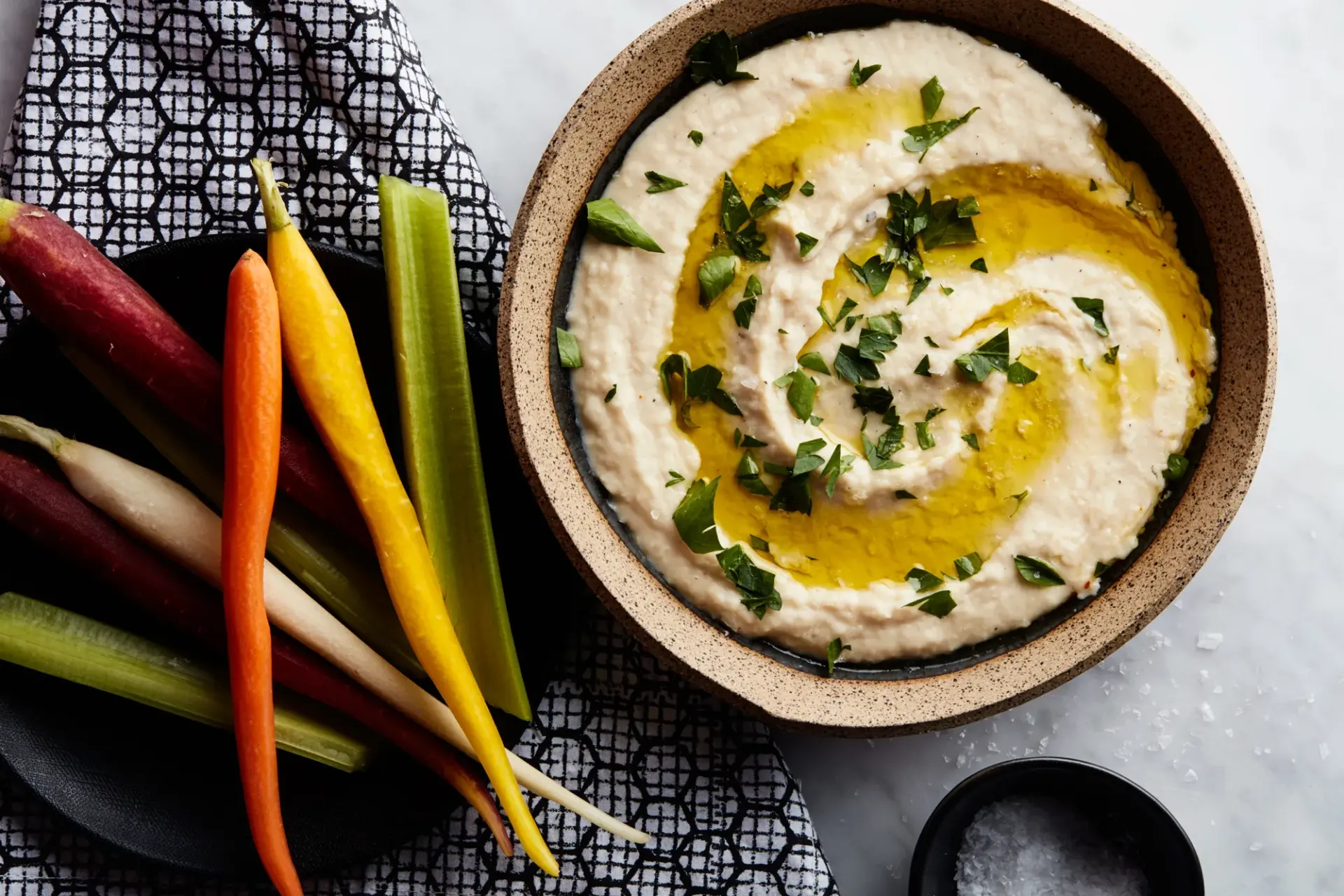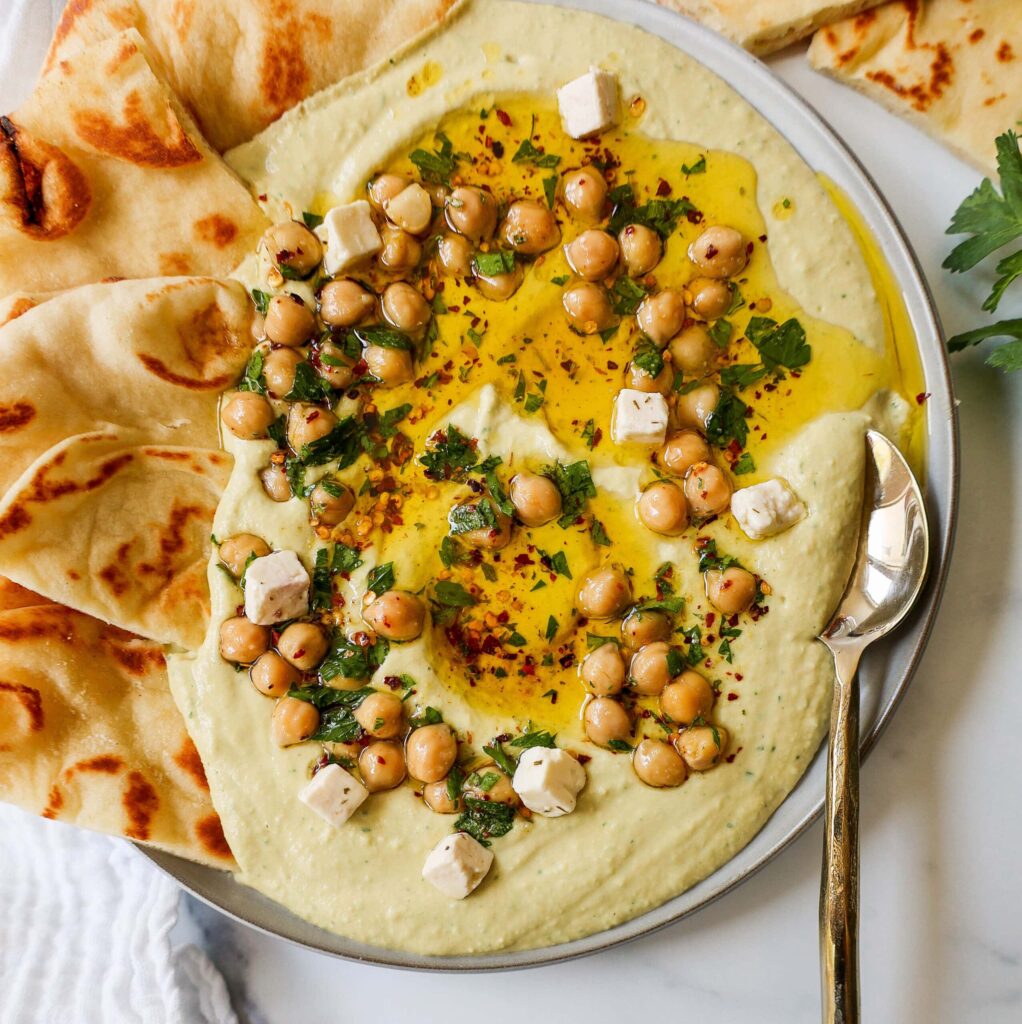
In the realm of wholesome nutrition, hummus stands as a versatile and delightful concoction, offering a harmonious blend of flavor and health benefits. Originating from the Middle East, this savory spread has transcended cultural boundaries to become a global culinary phenomenon, loved for its rich taste and nutritional prowess. Let’s embark on a more detailed exploration of the nutritional wonders that hummus brings to the table, understanding each component’s unique contribution.
The Power-packed Chickpea Base

At the core of hummus lies the unassuming yet mighty chickpea. Beyond its role as a protein source, chickpeas are a complex reservoir of nutrients that contribute to overall well-being. Rich in vitamins, minerals, and antioxidants, these legumes go beyond mere sustenance. Research indicates that the regular consumption of chickpeas may be linked to improved glycemic control, making them a valuable addition to diets aimed at managing blood sugar levels. The intricate interplay of fibers and phytochemicals in chickpeas may also have a positive impact on gut health, fostering a diverse and robust microbiota.
Moreover, the protein content in chickpeas is not only vital for muscle growth but also plays a role in satiety, making hummus a satisfying and nutritious option for those seeking a plant-based protein source. When combined with other elements in hummus, such as tahini and olive oil, the chickpea base creates a nutritional synergy that goes beyond the sum of its parts, offering a holistic approach to health and nourishment.
Sesame Seeds: Unveiling the Tahini Twist
Tahini, the velvety paste derived from sesame seeds, brings more than just a creamy texture to hummus; it introduces a host of nutritional benefits that contribute to overall vitality. Sesame seeds, the raw material for tahini, are rich in lignans, compounds known for their potential anticancer properties. Studies suggest that these bioactive components may play a role in inhibiting the growth of certain cancer cells, adding a layer of health protection to the hummus experience.
The incorporation of tahini into one’s diet also brings a notable dose of essential fatty acids. These healthy fats, including omega-3 and omega-6, play a pivotal role in supporting brain health, reducing inflammation, and maintaining the integrity of cell membranes. In addition to its contribution to heart health, the presence of these fatty acids enhances the cognitive benefits of hummus, making it a flavorful and brain-nourishing choice for those seeking holistic well-being.
Olive Oil Elegance: Nourishing from Within
The golden elixir, olive oil, not only elevates the taste of hummus but also adds a layer of nutritional elegance to this beloved spread. The monounsaturated fats found in olive oil have been extensively studied for their cardiovascular benefits. Regular consumption has been associated with a reduced risk of cardiovascular diseases, thanks to its ability to lower LDL cholesterol levels and maintain arterial health. The potent antioxidants in olive oil, such as polyphenols, contribute to its anti-inflammatory properties, making it a valuable ally in the quest for overall health.
Beyond cardiovascular benefits, olive oil’s role in hummus enhances the absorption of fat-soluble vitamins, including vitamins A, D, E, and K, present in other components of the spread. This nuanced interaction ensures that the nutritional benefits of hummus are not only diverse but also readily accessible to the body. Embracing the elegance of olive oil in hummus elevates its nutritional profile, turning it into a culinary indulgence that nurtures from within.
Garlic and Lemon Zest: A Flavorful Boost with Benefits
The marriage of garlic and lemon zest in hummus is not merely a dance of flavors; it is a strategic alliance that brings a myriad of health benefits to the forefront. Garlic, with its pungent aroma and distinct taste, is a treasure trove of bioactive compounds. Allicin, the active ingredient in garlic, exhibits antimicrobial and antioxidant properties, bolstering the body’s defense mechanisms against infections and oxidative stress.
In addition to its immune-boosting prowess, garlic has been studied for its potential in managing blood pressure and supporting heart health. The sulfur-containing compounds in garlic contribute to its vasodilatory effects, promoting healthy blood flow and cardiovascular function. The inclusion of garlic in hummus not only enhances its flavor but also infuses it with a therapeutic touch, making it a savory choice for those seeking to fortify their health through culinary delights.
Lemon zest, with its zesty and citrusy essence, complements the robustness of garlic in hummus. Beyond its role in enhancing flavor, lemon zest contributes a significant dose of vitamin C. This essential vitamin is a potent antioxidant that supports immune function, aids in collagen synthesis for skin health, and plays a role in iron absorption. Together, garlic and lemon zest transform hummus into a flavorful boost with multifaceted health benefits, showcasing how a simple spread can be a culinary celebration of well-being. As you follow the path of this delicious and healthy dish and learn more about the benefits of hummus, install the roadside assistance app to be sure if any problem arises.
Versatility on Your Plate: Beyond a Simple Dip
Hummus’s versatility extends far beyond its traditional role as a dip for pita or veggies. Its adaptability in various culinary creations transforms it from a mere condiment to a star ingredient in a diverse array of dishes. Spread it generously on whole-grain toast for a nutritious breakfast or use it as a wholesome sandwich condiment. Incorporate it into salad dressings for a creamy texture and a burst of flavor that elevates your greens to new heights. The adaptability of hummus opens up a world of possibilities for those seeking both culinary creativity and a nutrient-packed diet.
Moreover, the versatility of hummus extends to accommodating different dietary preferences. Whether you follow a plant-based diet, are exploring Mediterranean cuisine, or simply love experimenting with flavors, hummus seamlessly integrates into various culinary traditions. Its adaptability not only caters to diverse tastes but also ensures that individuals with different nutritional needs can enjoy its benefits. Embracing hummus as a versatile companion on your plate allows you to explore new dimensions of taste while nourishing your body with a medley of essential nutrients.
The Mysterious Magic of Chickpea Phytochemicals

While we’ve celebrated the protein and fiber content of chickpeas, there’s another layer to their nutritional prowess—phytochemicals. These plant compounds, distinct from vitamins and minerals, possess bioactive properties that contribute to human health. Chickpeas contain a variety of phytochemicals, including flavonoids, saponins, and polyphenols, each with its unique set of benefits. Many people are not at all aware of the huge benefits of this ingredient, but with an internet service provider that manages IT services in San Antonio, the perfect internet is available for users to research these topics.
Flavonoids, known for their antioxidant properties, play a crucial role in neutralizing free radicals and reducing oxidative stress in the body. Saponins, on the other hand, have been studied for their potential anti-inflammatory effects and may contribute to immune modulation. Polyphenols, abundant in chickpeas, have been associated with a range of health benefits, from supporting heart health to promoting gut microbiota diversity.
The inclusion of these phytochemicals in hummus enhances its nutritional complexity, offering not only sustenance but also a defense mechanism against the oxidative challenges of modern life. As you indulge in the rich flavors of hummus, know that you are partaking in a mysterious magic that goes beyond the visible nutritional components. While waiting for your car to be diagnosed at the transmission service in Buffalo, you can visit one of the great vegetarian restaurants in the area that will offer you healthy hummus specials.
Tahini’s Trace Minerals: Unearthing the Hidden Gems
Tahini not only adds creaminess to hummus but also introduces a plethora of trace minerals that are often overlooked. Beyond the spotlight on calcium and magnesium, tahini contains lesser-known minerals like copper, manganese, and zinc, each playing a unique role in maintaining physiological balance. While staying in Asia you can experience the real full taste of tahini, and to find the best restaurants you will need to use the capabilities of e-sim.
Copper, an essential trace element, contributes to the formation of red blood cells and collagen. Manganese, while required in smaller amounts, supports bone formation and metabolism. Zinc, a crucial player in immune function and wound healing, adds an extra layer of health support.
These trace minerals, though needed in minute quantities, are vital for the proper functioning of enzymatic reactions and cellular processes in the body. Tahini’s contribution to hummus ensures that you not only enjoy a velvety texture but also receive a subtle infusion of these hidden gems, adding a touch of nutritional finesse to your culinary experience. Minerals, as good as they are for our body, can be bad in our lives, for example, limescale that is in the water and can accumulate in the pipes and lead to bursting can create a problem that is then solved by an emergency restoration service in Charlotte.
Olive Oil’s Polyphenolic Ensemble: A Symphony of Health
The golden hues of olive oil not only bring visual appeal to hummus but also herald the presence of polyphenols, a diverse group of bioactive compounds with extensive health benefits. Beyond the well-known antioxidants, olive oil’s polyphenolic ensemble includes compounds such as hydroxytyrosol, oleuropein, and tyrosol, each with its unique set of health-promoting properties. With the help of useful kitchen appliances today, it is possible to prepare food in healthier ways with just a little olive oil, but if an appliance breaks down, you can take it in for repair at an appliance repair service in Washington DC.
Hydroxytyrosol, recognized for its potent antioxidant activity, has been linked to cardiovascular health by supporting blood vessel function and reducing inflammation. Oleuropein, another key player, exhibits anti-inflammatory and anti-microbial effects, contributing to overall immune resilience. Tyrosol, with its potential neuroprotective properties, adds a layer of support for cognitive well-being. Science tutors in Boulder teach their students about the importance of these elements in nutrition by introducing them to their structure and ways of action.
The polyphenolic ensemble in olive oil transforms hummus into more than just a tasty spread; it becomes a symphony of health that resonates with the intricate dance of these bioactive compounds. As you enjoy the richness of olive oil-infused hummus, you are partaking in a gastronomic experience that echoes the subtleties of nature’s healing elements. To complete this harmonious experience of enjoying hummus with your loved ones, you can add to the atmosphere pleasant sounds of music from some of the records that you can buy or sell vinyl records for cash.
Garlic’s Allicin Alchemy: Aromatic Health Elixir
The distinct aroma of garlic in hummus not only tantalizes the senses but also introduces allicin, a sulfur-containing compound with a myriad of health benefits. Allicin, formed when garlic is crushed or chopped, exhibits antimicrobial, anti-inflammatory, and antioxidant properties, making it a potent elixir for overall well-being. In order to feel the true value of garlic in food and enjoy specialties with garlic, tourists can book cheap flights to Italy, where they will encounter many delicious dishes that contain the strong taste of this vegetable.
Beyond its immediate effects on immune support, allicin has been studied for its potential cardiovascular benefits. It may contribute to the reduction of blood pressure and cholesterol levels, fostering heart health. The aromatic alchemy of allicin in hummus adds more than just flavor; it brings a therapeutic touch that resonates with the ancient wisdom of culinary medicine. One of the substances whose excellent properties were known back in history and which travelers required in their food which they carried on their saddle blankets while traveling, believing that garlic will keep them safe from accidents on the road and sickness.
Lemon Zest’s Limonene Boost: Citrusy Wellness in Every Bite
Lemon zest, with its citrusy essence, not only brightens the flavor of hummus but also introduces limonene, a compound found in citrus fruits with promising health attributes. Limonene, recognized for its potential anti-cancer properties, has been studied for its ability to inhibit the growth of certain cancer cells and induce apoptosis, the programmed cell death essential for maintaining cellular balance. The health clinic in Marietta GA recommends food with this component to its patients as an excellent defense against colds, although if you experience stronger symptoms, you can always visit a doctor.
Additionally, limonene exhibits anti-inflammatory and antioxidant effects, contributing to overall wellness. The inclusion of lemon zest in hummus adds a zesty twist that goes beyond taste; it brings a burst of citrusy wellness in every bite, reminding us that even the smallest components can have a significant impact on our health journey. The introduction of citrus both in the diet and in supplements or smoking accessories can in some way contribute to health and certainly to the general smell that will remind you of walking through Mediterranean lemon orchards.
A Culinary Tapestry: The Art of Hummus Beyond Nutrition

Hummus transcends its nutritional components to become a culinary tapestry, weaving together diverse flavors, textures, and cultural influences. Beyond the tangible health benefits, the act of sharing hummus often becomes a communal experience, fostering connections and creating memorable moments around the table. Enjoy a healthy family meal in the comfort of your home in Boca Falls while sharing your love of hummus with your loved ones.
Its cultural significance extends beyond the Mediterranean region, becoming a global symbol of shared meals and conviviality. Whether enjoyed in a family setting, shared among friends, or savored solo, hummus embodies the art of bringing people together through the universal language of food. Its rich history, spanning centuries and crossing borders, adds depth to each dollop, making hummus not just a dish but a cultural ambassador that transcends boundaries. If you are in Europe, rent a car in Beograd and visit one of the Mediterranean centers where you will find the most diverse variations of hummus and enjoy their unusual taste.
Conclusion: Savoring the Culinary and Nutritional Overture
As we conclude our exploration of hummus, it’s evident that this culinary creation is not just a spread; it’s a symphony of flavors, textures, and nutritional benefits. From the mysterious magic of chickpea phytochemicals to the aromatic alchemy of garlic, each component adds a unique note to the composition, creating a culinary and nutritional overture that invites us to savor every bite.
Hummus, in its entirety, becomes more than the sum of its parts. It’s a celebration of diverse elements coming together, reflecting the beauty of balance and harmony in both culinary and nutritional aspects. So, as you dip into a bowl of hummus or spread it on your favorite dish, relish in the knowledge that you are not just enjoying a meal; you are partaking in a symphony that nourishes the body, delights the palate, and brings people together in a shared experience of joy and well-being.
